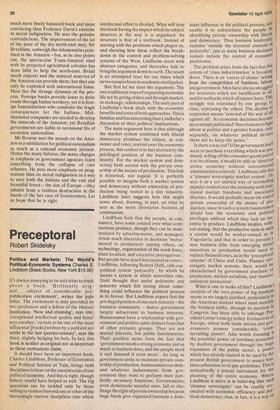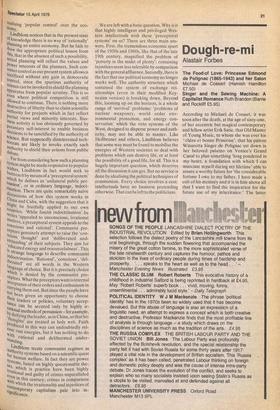Preceptoral
Robert Skidelsky
Politics and Markets: The World's Political-Economic Systems Charles E. Lindblom (Basic Books, New York $15.00)
It's always annoying to be told what to think about a book. 'Brilliantly original ... subject of considerable prepublication excitement', writes the publisher. The excitement is duly provided by two professors and a fellow of the Hoover Institution. 'New and stunning', says one; 'exceptional intellectual quality and force' says another; 'certain to be one of the most influential [books] written by a political scientist in the last quarter-century', says the third, slightly hedging his bets. In fact, this book is neither as original nor as important as these enthusiasts claim.
It should have been an important book. Charles Lindblom, Professor of Economics and Political Science at Yale, brings both disciplines to bear on the current crisis of our political economy. And this is right, though history would have helped as well. The big questions can be tackled only by those willing to venture beyond one or other of the increasingly narrow disciplines into which
intellectual effort is divided. What will stop this book having the impact which its subject deserves is the way it is organised. Its structure is that of a textbook. Instead of starting with the problems which plague us, and showing how these reflect the breakdown in the control and problem-solving systems of the West, Lindbolm starts with abstract categories, and thereafter fails to bring the argument down to earth. The result is an attempted tract for our times which neverescapes from its academic straitjacket.
But first let me state the argument. The two traditional ways of organising economic life are by giving orders and through market, or exchange, relationships. The early part of Lindbolm's book deals with the economic benefits and costs of both approaches. This is familiar and less interesting than Lindbolm's discussion of their political implications.
The main argument here is that although the market system combined with liberal democracy promises the citizen, as consumer and voter, control over the economic process, this control is in fact aborted by the privileged position of the business community. For the market system and democracy both coexist with the private ownership of the means of production. This link is historical, not logical. It is perfectly possible to imagine both a market system and democracy without ownership of production being vested in a tiny minority. Lindblom later suggests how this might come about, drawing, in part, on what he sees as the more libertarian features of communism.
Lindblom feels that the people, as consumers, have some control over what corporations produce, though they can be manipulated by advertisements, and managers retain much discretion in decisions 'instrumental to production: among others, on technology, organisation of the work force, plant location, and executive prerogatives'. But people have much less control as voters. Lindblom, following Robert Dahl, calls our political system 'polyarchy', by which he means a system in which minorities rule.
Dahl thought that under polyarchy any minority which felt strong about something could influence the political process in its favour. But Lindblom argues that the privileged position of one such minority—the business community — makes government largely subservient to business interests.
Businessmen have a relationship with government and politics quite distinct from that of other pressure groups. They are not special interests, but public functionaries. Their position stems from the fact that 'government needs a strong economy just as much as business does, and the people need it and demand it even more'. As long as government seeks to maintain private own ership of production, businessmen can demand whatever inducements from gov ernment they want to perform their pub lically necessary functions. Governments, even democratic socialist ones, fail to cha llenge the right of private ownership because huge funds give organised business a dom
inant influence in the political process, and enable it to indoctrinate the people hY identifying private ownership with liberty and democracy. Thus business leadershiP remains 'outside the electoral controls of polyarchy', just as many business decisions remain outside the control of consumer preference. The problem arises from the fact that this system of 'class indoctrination' is breaking down. There is an 'excess of claims' arising from the competition of business, labour and government. Men have always struggled for resources which are insufficient to all and for authority which all cannot have. This struggle was restrained by one group, °r class, repressing the others. The decline of repression means 'renewal of the war of all against all'. As economic decisions become increasingly politicised 'there is more to fight about in politics and a greater burden, con' sequently, on whatever political devices there are to keep the peace.' Is there a way out? If the government itself were to purchase everything which was pro; duced, selling off the consumer goods part° it to its citizens, it would be able to 'direct an entire economy without conventional administrative controls'. Lindblom calls this a 'planner sovereignty market system'. sees sees it as a yet untried way of reconciling popular control over the economy with traditional market freedoms and associated, liberties. It would probably mean the end 0' private ownership of the means of pt°duction, since in such a system businessmen would lose the economic and political privileges without which they lack an ine' entive to produce. Lindblom implies, with out stating; that the productive units in such a system would be worker-owned as in Yugoslavia; and that in order to prevent a. new business elite from emerging moral incentives to production would need to replace financial ones, as in the 'preceptoral systems' of China and Cuba. Planner sovereignty market systems, then, would be characterised by government purchase.or production, market socialism, and 'massive unilateral persuasion'.
What is one to make of this? Lindblom analysis of the veto power of big business seems to Inc largely justified, particularlY in the American context where most recentlY the business lobby, through its position 10 Congress, has been able to sabotage president Carter's energy policy. It is less true 0' Europe, where both trade unions and governments possess considerable 'coin!' tervailing power'. Also worth stressing the potential power of purchase possessed by modern government through the huge expansion of the public sector, a power which has already started to be used by the present British government to secure bur mess adherence to its pay guidelines. This 15 undoubtedly a potent instrument for the planning of the entire economy. Where Lindblom is naive is in believing that such 'planner sovereignty' can be readily reconciled with economic efficiency and pot; itical democracy; that, in fact, it is a way 0'
realising 'popular control' over the economy.
Lindblom notices that in the present state of knowledge there is no way of 'rationally' Planning an entire economy. But he fails to draw the appropriate political lesson from this, that in the absence of such a possibility, actual planning will reflect the values and Power interests of the planners. Such consumer control as our present system allows is sacrificed without any gain in democratic control, since the spurious authority of science can be invoked to shield the planning apparatus from popular scrutiny. This is so c,ven where political competition is Still allowed to continue. There is nothing more destructive of liberty than to claim scientific authority for projects which in fact reflect
Partial views and minority interests. Bus iness activity is too obviously governed by Pecuniary self-interest to enable business
decisions to be sanctified by the authority of science. But supposedly disinterested technocrats are likely to invoke exactly such authority to shield their actions from public kiebate.
Par from considering how such a planning system might be made responsive to popular wishes, Lindblom in fact would seek to buttress it by means of a 'preceptoral system' which he defines as 'unilateral public per
sn. asion', or in ,ordinary language, indoct rination. There are quite remarkably naive discussions of how this system works in
China and Cuba, with the suggestion that it
nught be fruitfully applied to our own societies. • While fascist indoctrination' he
writes 'appealed to unconscious, irrational
Motives, a preceptoral system appeals to the conscious and rational'. Communist pre
ceptors genuinely attempt to raise the 'con
selmis thought' and 'deliberated understanding of their subjects. They aim for .educated energy and resourcefulness'. This
ls strange language to describe communist
lndoctrination. 'Rational', 'conscious', 'del!berated' are all words in the Western Ianguage of choice. But it is precisely choice which is denied by the communist preceptors. What the preceptors want is internal ac cePtance of their orders and enthusiasm in carrying them out. But since the people have hot. been given an opportunity to choose ;heir leaders or policies, voluntary accepan,ce can be secured only by highly ir!•ational methods of persuasion — for example, ,nY deifying the leader, as in China, so that his thoughts' are treated as holy writ. Faith Produced in this way can undoubtedly relellse vast energies, but it has nothing to do with rational and deliberated understanding.
Lindblom treats communist regimes as ,allthority systems based on a scientific quest isor human welfare. In fact they are power
sYstems, based on highly questionable the; es, .Which is practice have been highly
Irrational and guilty of crimes unparalleled with !ith en in this century; crimes in comparison Which the irrationality and injustices of
co capitalism pale into inignificance.
We are left with a basic question. Why is it that highly intelligent and privileged Western intellectuals wish these 'preceptoral systems' on us? There are three main answers. First, the tremendous economic spurt of the 1950s and 1960s; like that of the late 19th century, magnified the problem of 'poverty in the midst of plenty': remaining injustices seem less tolerable by comparison with the general affluence. Secondly, there is the fact that our political economy no longer works well. The authority structure which sustained the system of exchange relationships (even in their modified Keynesian version) is breaking down. Beyond this, looming up on the horizon, is a whole range of 'survival' problems: 'problems of nuclear weaponry, world order environmental protection, and energy conservation' which the veto systems of the West, designed to disperse power and authority, may not be able to master. Like Heilbroner and others, Lindblom believes that some way must be found to mobilise the energies of Western societies to deal -with problems which can destroy life, or at least the possibility of a good life, for all. This is a hugely important question, which deserves all the discussion it can get. But no service is done by idealising the political techniques of communism. Every choice involves a cost: intellectuals have no business pretending otherwise. That can be left to the politicians.



































 Previous page
Previous page